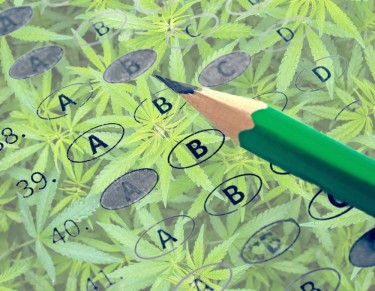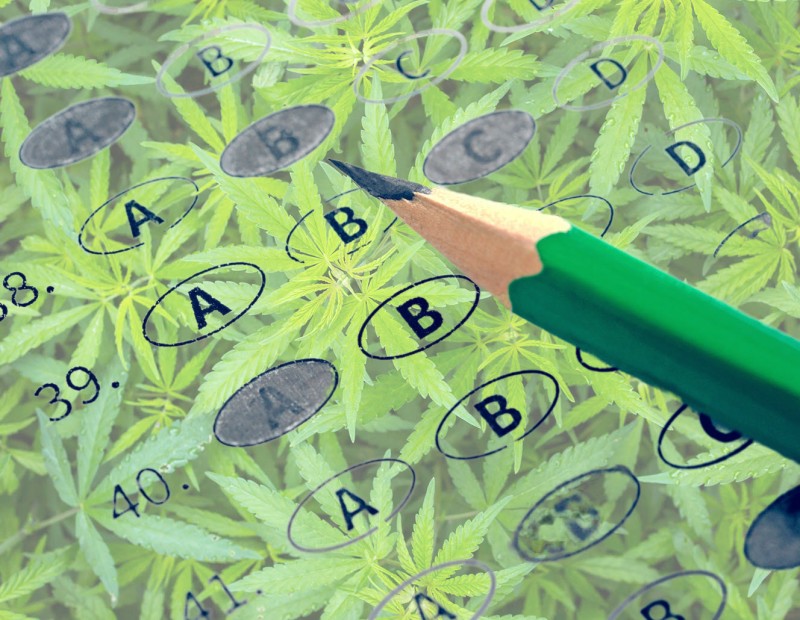
Colleges located in states where recreational marijuana was legalized within the last decade experienced a noteworthy, albeit transient, surge in applications from high-achieving students. Additionally, there was a general increase in overall application numbers. These are the principal findings from a recent study, which was recently published in the peer-reviewed journal Contemporary Economic Policy.
During the year when a specific state legalized recreational marijuana, the respective colleges witnessed a growth in applications of approximately 5.5% more than colleges situated in states where such legalization did not occur. This implies that colleges in states where recreational marijuana is legal received a temporary upswing in application numbers, with no discernible sustained increase beyond the initial surge.
It's important to note that the results account for factors such as school quality, tuition prices, and labor market conditions that could potentially influence student application decisions. Digging into the specifics, the most significant increases were evident among the largest schools, which saw an almost 54% surge in applications compared to similarly sized institutions in states where recreational marijuana remained illegal.
Public colleges and universities experienced more significant benefits than private ones, although there was also an uptick in applications for private schools in states where recreational marijuana was legalized.
Furthermore, there was an increase in applications from high-achieving students. The standardized test scores for the top 25% of applicants rose in tandem with the overall increase in the quantity of applications.
Why It's Significant
As researchers continue to evaluate the pros and cons of recreational marijuana, our findings highlight that institutions of higher learning experience advantages when their home states permit recreational cannabis use. One notable advantage is the availability of a larger and more accomplished applicant pool, potentially enhancing a school's academic profile. Recent studies show that college students prefer cannabis over alcohol in new legal state data.
The results contribute to a broader body of research examining factors influencing students' application decisions. The observed parallels between the surge in applications and SAT scores associated with successful sports teams at schools and the spikes observed when institutions are located in states that have legalized marijuana. While the data doesn't definitively establish causation, it suggests that students may consider local policies in their college choices—a noteworthy finding for scholars and policymakers alike.
Another recently released study show how cannabis is being used as a successful study-aid to current college students, helping them focus and quiet hyper-active minds.
How The Work is Conducted
The researchers utilize the Integrated Postsecondary Education Data System (IPEDS), a federal database commonly known as IPEDS, to access a range of college metrics. These metrics encompass the number of applications, demographic characteristics of students, and detailed tuition prices, both pre and post application of financial aid.
In conjunction with this dataset, state legislation is thoroughly examined to determine the availability of recreational marijuana to students in a given academic year. The researchers argue that as long as recreational marijuana is legally accessible before the end of January—often the deadline for many applications—it could reasonably impact a prospective student's decision for the following fall term.
The analysis considers the perception that students may view states with legalized recreational marijuana as more progressive.
What Remains Uncertain
The data at our disposal does not allow us to determine why incoming first-year students, often transitioning directly from high school and thus not yet of legal age (21) to purchase recreational marijuana, might factor in its availability when making application decisions.
Possibly, the existence of legal sales creates a perception among prospective applicants that underage consumption is less fraught with risks. Alternatively, heightened media coverage might make certain states appear more appealing.
Another hypothesis is that more permissive public policies, such as marijuana laws, in a particular region may imply more attractive and liberalized policies in other areas critical to students, such as abortion. Definitive conclusions can only be drawn with direct insights from the students themselves.
Additionally, there is uncertainty regarding the extent to which out-of-state students drive the surge in applications post-legalization. For instance, did marijuana legalization in Colorado lead to more applications from students in other states?
On the flip side, students living within the state may have chosen to submit applications to an increased number of Colorado schools compared to what they would have done in the absence of recreational marijuana, with the intention of staying within their home state.
The IPEDS database does not mandate schools to distinguish between applicants from in-state and out-of-state, contributing to the challenge of precisely identifying the origin of applicants. However, it does distinguish enrollees as either in-state or out-of-state.
Based on this, it is observed that out-of-state enrollees increased by nearly 25% for the largest schools in the year of marijuana legalization. It is crucial to note that applying and enrolling represent distinct actions; applying signifies interest while enrolling is a more committed step.
The Way Forward
A more comprehensive examination of the impact of legalization on college application rates could provide valuable insights for institutions in states where cannabis consumption is permitted without the risk of legal consequences.
Similarly, exploring the effects of legalized marijuana on student outcomes across all schools while considering the nationwide disruptions associated with COVID-19 would offer further valuable perspectives.
Conclusion
The study underscores a temporary uptick in college applications for institutions in states that have legalized recreational marijuana. This implies that changes in local laws play a role in influencing the appeal of these schools to prospective students. Yet, there remain unanswered questions about the reasons behind this surge and whether it has lasting consequences.
The researchers are particularly interested in understanding if students from other states drive the increase in applications. Unfortunately, the available data doesn't clearly distinguish between in-state and out-of-state applicants.
Looking forward, there is a need for further exploration into how marijuana legalization might impact college applications more broadly, considering the challenges posed by the COVID-19 pandemic. The research contributes to the ongoing discourse surrounding the various factors that shape students' decisions in the dynamic landscape of higher education.







